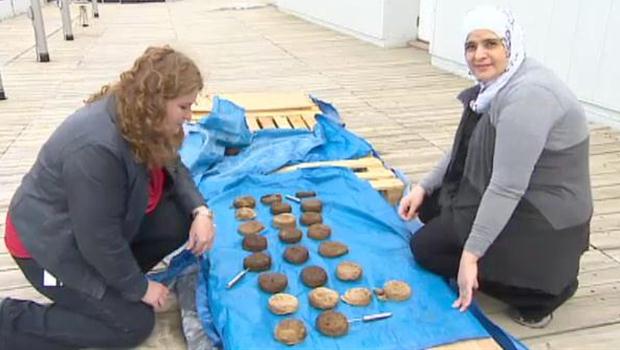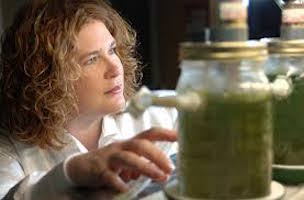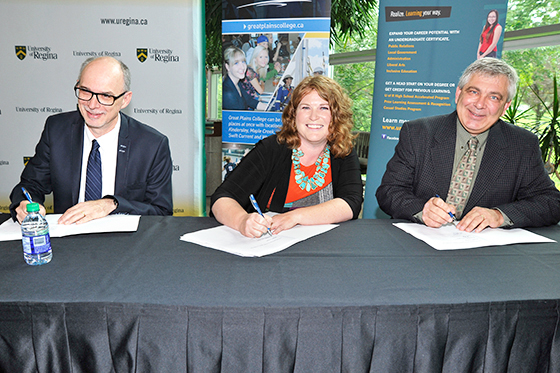
Media
Water Competition and Conflict: Southern Alberta Council on Public Affairs
Many regions in the Canadian Prairies and American Midwest are managing declining water resources, lower snowfall volumes and less predictable precipitation events. With the impacts of changing climate beginning to become more evident and impactful on our behaviours, livelihoods, and economic development and sustainability, what are some of the innovations and research activities at the University of Lethbridge that are helping to improve resource awareness, management, and conservation? Through this presentation, we seek a discussion about the challenges, constraints, and competing interests that are making water management increasingly difficult and important for southern Alberta.
Date and time: Thursday, January 20, 2022 from 12 noon to 1 pm MST
Solar panel canal covers discussed at SACPA
Addressing water management in southern Alberta: ‘We will have more droughts’
Global LethbridgeTelevision
URL: https://globalnews.ca/news/8527635/southern-alberta-drought-water-management/
UofR Students Study Recycling & Waste-to-Energy Technologies for City of Yorkton
CTV NewsTelevision
TV story matching print media on students working on regional waste management solutions
Water bottles in landfills
Global TVTelevision
A review of how plastic (does not) degrades in landfills.
Plastic Bags Ban in Toronto
CTV Morning LiveTelevision
The trend toward banning plastic shopping bags
Poop on the Roof
Radio Canada International, Canada.com, CBC Radio, CBC The NationalTelevision
URL: http://www.rcinet.ca/en/2013/05/15/poop-on-the-roof/
Professor McMartin’s research involves taking cow manure from farms and studying its survivability in the winter in different conditions.
Bale-grazing as a Best Management Practice (BMP): WEBs field day
CTV News and Farm GateTelevision
Field Day with agricultural producers and media highlight best management practices for protection of water resources
CKRM 620: Saskatchewan Agriculture TodayRadio/Podcast
A discussion of how agricultural practices can support farmer resiliency to potential flooding events
NewsTalk 980Radio/Podcast
Discussion of potential climate change impacts on water
CBC RadioRadio/Podcast
How coliforms may survive and be transported in spring melt water.
CBC RadioRadio/Podcast
Review of the issues and emergence of water quality challenges that lead to a boil water advisory in Moose Jaw and Regina, SK.
Women in Science: Regina hosts CCWESTT conference
Leader PostPrint
URL: http://www.pressreader.com/canada/leader-post/20150228/282505772054172
Chair of the national conference for Canadian Coalition for Women in Engineering, Science, Trades, and Technology introduces the conference to Regina.
Women in the Professions
APEGS The Professional EdgePrint
A discussion of women in professional engineering and geosciences in Sask, Canada, and beyond.
Students to find true story of recycling
Yorkton This Week, The New ReviewPrint
UofR Students working with the City of Yorkton to design a better regional waste management system
New Dean, Brighter Future?
Carillon (UofR student newspaper)Print
URL: http://www.carillonregina.com/new-dean-brighter-future/
The Faculty of Engineering and Applied Science is one of the University of Regina’s most prominent faculties...
More than a rooftop garden
Leader Post and WD NewsletterPrint
URL: http://www.warehousedistrict.ca/news/documents/WDnewsletterWinter2008_001.pdf
High profile building hosts research project into green roofing design and materials in Saskatchewan.
Energy Futures: Transition Management for Sustainable Energy in Saskatchewan
APEGS The Professional EdgePrint
Outlining prospects for a changing energy grid design and social acceptance for change.
A Wetter Tomorrow
Leader Post, Prairie DogPrint
An op-ed on flood planning and management issues.
International Day of Women & Girls in Science
University of Lethbridge, February 7, 2022Online
URL: https://stories.ulethbridge.ca/international-day-of-women-girls-in-science/
February 11 is the International Day of Women and Girls in Science – a day for the global community to recognize the accomplishments and contributions of women and girls in science and focus on ways we can increasingly engage and empower women and girls with the sciences.
U of R strengthens partnership with Great Plains College in Swift Current
University of ReginaOnline
URL: http://www.uregina.ca/external/communications/feature-stories/current/2016/07-12.html
The University of Regina and Great Plains College are strengthening their long-standing partnership of delivering post-secondary education at the College in Swift Current.
The Role of Inclusion Binding Contributions for β-Cyclodextrin Polymers Cross-Linked with Divinyl Sulfone?...
Published by Molecules
2016 This commentary reports on a recent scientific study reported in this journal (cf. Molecules 2015, 20 (3), 3565–3581). Some key scientific issues that require further explanation and clarification in the former article are as follows:(i) the relationship between the inclusion site accessibility and the level of cross-linking employed are brought into question for the case of α-CD and β-CD cross-linked adsorbent materials;(ii) the binding affinity of the CD/guest complexes were not related to the isotherm parameters for the CD- ...
The application of HPLC ESI MS in the investigation of the flavonoids and flavonoid glycosides of a Caribbean Lamiaceae plant with potential for bioaccumulation
Published by Journal of Environmental Science and Health
2015 As part of an exchange technology program between the government of Barbados and Environment Canada, methanolic and aqueous extracts from the flavonoid-rich Lamiaceae family were characterized using negative-ion electrospray mass spectrometry. The species investigated is part of the Caribbean Pharmacopoeia, and is used for a variety of health issues, including colds, flu, diabetes, and hypertension. The extracts were investigated for structural elucidation of phenolics, identification of chemical taxonomic profile, and ...
Salts Removal from Synthetic Solution-Potash Brine by Non-Planted Constructed Wetlands
Published by Water
2016 Four pilot-scale non-planted constructed wetlands (CWs) were employed to study the fate and transport of the two dominant chloride salts contained in brine resulting from solution mining activities in the potash industry. The simulated brine contained a 10: 1 ratio of NaCl: KCl based on authentic brine characteristics. The multi-layer soils functioned as a main salt filtering component comprising of Regina Clay, sand and gravels. The CW systems were operated in three batches of 16 days (experiments 1–3). K+ ions were removed by ...
Fourier Transform Ion Cyclotron Resonance Mass Spectrometry Characterization of Treated Athabasca Oil Sands Processed Waters
Published by Energy & Fuels
2014 Ultrahigh-resolution negative-ion electrospray ionization Fourier transform ion cyclotron resonance mass spectrometry (FT-ICR MS) was used to characterize Athabasca oil sands processed water (OSPW) treated by (A) coagulation flocculent with lime and bentonite,(B) coagulation flocculent with lime and bentonite followed by activated carbon, and (C) combined ozonation and ultrasonication. Treatment A was ineffective in reducing the level of total naphthenic acid fraction components [NAFCs, defined as the acid-extractable fraction ...
Effects of Extraction pH on the Fourier Transform Ion Cyclotron Resonance Mass Spectrometry Profiles of Athabasca Oil Sands Process Water
Published by Energy & Fuels
2015 A comparison of the acidic and basic extracts of oil sands process water (OSPW) was performed using positive-and negative-ion electrospray ionization (ESI) and atmospheric pressure photoionization (APPI), coupled with a 12 T solariX Fourier transform ion cyclotron resonance mass spectrometer (FTICR MS). In general, the acid-neutral extracts showed higher oxygen content within the negative-ion profiles (both APPI and ESI). The hydrocarbon class was readily observed in the base-neutral extract. Furthermore, a comparison of O2S ...
URL: http://pubs.acs.org/doi/abs/10.1021/acs.energyfuels.5b02086
Biography
Dr Dena McMartin is the Vice President (Research) at the University of Lethbridge. She is a leading researcher focused on rural, agricultural, and industrial water resources management and treatment, as well as impacts of freshwater climate extremes on communities and economies. Dena joined the UofL in 2021, having previously served in academic leadership and faculty roles at both University of Saskatchewan and University of Regina.
Holding both professional engineer (PEng) and professional agrologist (PAg) credentials, Dr McMartin has served on the national executives and committees of Engineers Canada, Senior Women Academic Administrators of Canada, and the Canadian Coalition for Women in Engineering, Science, Trades and Technology, as well as more regionally focused boards such as Innovation Saskatchewan, Livestock and Forage Centre of Excellence, and SaskWater Corporation. She has been honoured with a YWCA Women of Distinction Award and Fellowships from Engineers Canada (FEC) and the Canadian Society of Senior Engineers (FCSSE). Dena also served on the bilateral working group for integrating diversity into science and engineering research and technology development hosted jointly by NSERC and the NSF and was the SSHRC Leader at USask.
Dr McMartin holds Ph.D. and M.Sc. degrees in environmental engineering and a B.Sc. degree in agricultural and bioresource engineering from USask. She is an NSERC and SSHRC funded researcher, also holding funding from federal and provincial agencies and industry partners. She maintains supervision of several graduate students and operation of laboratory facilities with research partners in SK with whom she regularly co-authors peer-reviewed papers and presentations. For more than 20 years, she has contributed to a world-leading team working on active solutions to characterize and remediate Athabasca Oilsands process water.
Dena was raised in Saskatchewan, has worked in Germany and Barbados, and conducted part of her sabbatical research with colleagues in Australia. She is an avid golfer and traveler who enjoys immersing herself in the culture and history of a place. She is an enthusiastic research leader and diversity advocate.
Recognition/Reconnaissance
YWCA Women of Distinction Award: Science, Technology and Environment
This recipient has achieved excellence and made significant contributions to a science related field, including pure and applied sciences, social sciences, engineering and life sciences, medicine, technology, agriculture or the environment. She is dedicated to the advancement of technological, scientific or industrial discovery through either research or application, or to the preservation or improvement of the environment.
Volunteer Service Award: Regina Engineering Society | Professional
This award recognizes a Professional Engineer who is a member of the Regina Engineering Society and who shows a dedication to the improvement our society/community through their volunteer efforts.
McCannell Award | Professional
The McCannel Award was established in 1983 to honour service to the Association of Professional Engineers and Geoscientists of Saskatchewan, and to the Professions as a whole. The McCannel Award is named after Roy McCannel, a founding member of the Association.
Additional Titles and Affiliations
University of Regina : Professor Environmental Systems Engineering
Past Talks
Teaching Methods & Retention of Women in the Engineering Classroom
UofR President's Teaching & Learning Scholars Showcase
Regina, March 18, 2016
Strategic Directions for Indigenization at the University of Regina
Saskatchewan Post-Secondary Education Leadership Forum
Saskatoon, October 18, 2016
Pink Tea and National Day of Remembrance and Action on Violence Against Women
Nation Day of Remembrance and Action
Regina, December 6, 2016
Indigenizing Learning in Social Work, Nursing and Education programs
5th Meeting of the Mexico-Canada Collaboration on Intercultural and Indigenous Post-Secondary Education
Tulancingo, Mexico, November 1, 2016
Indigenous Health. Healthier Perspectives through Identities, Culture & Art.
5th Meeting of the Mexico-Canada Collaboration on Intercultural and Indigenous Post-Secondary Education
Tulancingo, Mexico, November 1, 2016
Art and Science of Setting and Achieving Goals
Women's Leadership Conference
Regina, April 19, 2017
Research Grants
Vulnerability and Adaptation to Climate Extremes in the Americas (VACEA)
Organization: IRIACC (International Research Initiative on Adaptation to Climate Change)Grant amount: 2.5M
Details:
An international research collaboration of natural scientists, engineers, and social scientists in Canada, Argentina, Brazil, Chile, and Colombia.
Strategic watershed cumulative effects management and treatment of rural and agricultural water
Organization: NSERCGrant amount: 100000
Details:
5-year Discovery Grant
Technical evaluation and siting assessment for complex industrial technologies
Organization: Sylvia Fedoruk Canadian Centre for Nuclear InnovationDate: March 1, 2017
Grant amount: 1.1M
Details:
The University of Regina team will be evaluating the water needs for various small reactor technology options. This will include options for the use of technologies that enhance both efficiency and benefit. The University of Saskatchewan contribution will look at contamination risks to water supplies from a spill of nuclear materials, delineating areas that are most suitable for a power plant from a groundwater perspective. “With the pace of economic development and growth of water‐intensive commercial and industrial projects in Saskatchewan and across the Prairies, and in the context of a changing climate that affects precipitation volumes, timing, and rates, there is significant need to quantify cumulative water requirements and availability, and to determine how our natural water resources may be impacted.”
More information: https://www.uregina.ca/external/communications/feature-stories/current/2017/03-16.html
Cumulative Effects Assessment for the future of clean energy development
Organization: Saskatchewan Ministry of EnvironmentGrant amount: 10000
Details:
Student funding to build momentum in lifecycle assessment for Saskatchewan's energy grid planning, in collaboration with Imperial College, London.
Evaluating Teaching Methods that Affect Recruitment and Retention of Female Students in Engineering
Organization: President's Teaching and Learning Scholars program (UofRegina)Grant amount: 3000
Details:
Social sciences research into the unique systems engineering programs at UofRegina and how the design of the programs, experiential learning models, and social environment influence female students' recruitment and retention.




